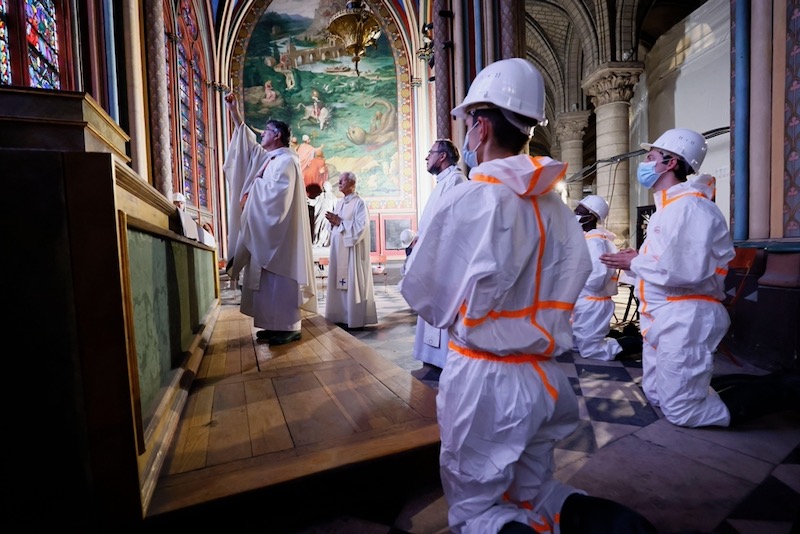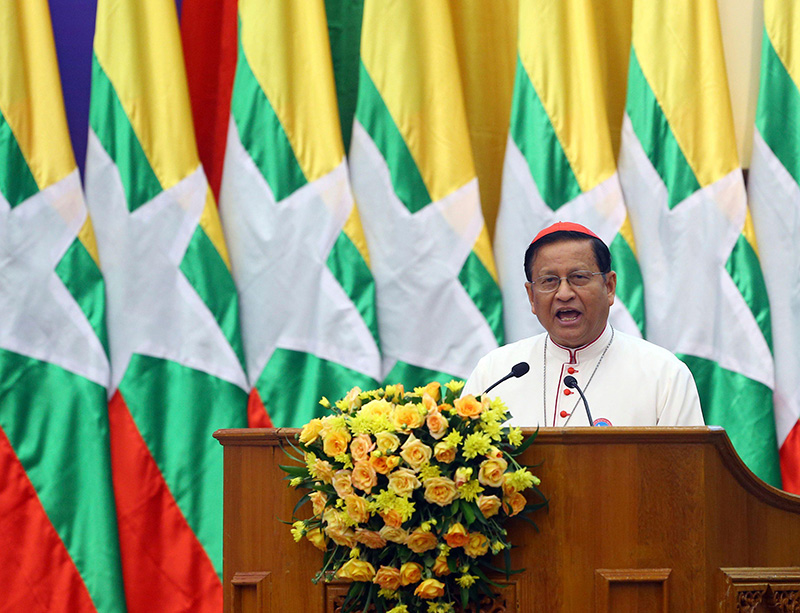Protesters in the Indian Archdiocese of Ernakulam-Angamaly burned copies of a decree by the apostolic administrator, Archbishop Andrews Thazath, ordering the adoption of the uniform liturgy of the Syro-Malabar rite, Holy Qurbana, by 2 July.
The archdiocese and its cathedral have refused the accept the reformed liturgy used in other dioceses, leading to riots and prompting a series of meetings of the Syro-Malabar hierarchy and Vatican officials in recent months.
Thazath said that to refuse the order “will be a violation of ecclesiastical laws” but local opponents planned to protest outside the cathedral on 2 July to prevent a celebration of the reformed rite.
A new church has opened in the Diocese of Bameng in Inner Mongolia, funded and built by the local Catholic community and on land allocated by the local government.
Three Chinese bishops – Bishop Matthias Du Jiang of the Patriotic Diocese of Shanba, Bishop Anthony Yao Shun of Jining and Bishop Paul Meng Quinglu of Hohhot – attended the inauguration, alongside 60 priests and 15 nuns.
“The new church is a place of God’s presence in our midst, a sign of our gratitude to the Lord and our faith and community,” said parish priest Fr Zhou Xueqing.
Inner Mongolia is an autonomous region of the People’s Republic of China, bordering Mongolia where Pope Francis will visit in September. Bameng has around 40,000 Catholics, including 24 priests and 27 nuns.
Celso Ba Shwe was ordained Bishop of Loikaw, in Myanmar’s eastern Kayah state, on 29 June. The state, where the majority of the population belongs to the Karenni people, has suffered heavily in the ongoing civil conflict.
Cardinal Charles Maung Bo, Archbishop of Yangon, presided at the service and said that in Ba Shwe the diocese has “a bishop who has accompanied his people on their way of the cross”. He described the new bishop as “the shepherd who lives among the sheep and smells the sheep, who knows their tears, their wounds and their scattering”.
Cardinal Bo challenged him “to bring love to a people who have experienced so much hatred”. More than 150,000 civilians in the Loikaw area have sought refuge in churches, makeshift refugee camps or in the jungle as fighting continues.
The previous week a Thai bishop has appealed his diocese to support refugees fleeing the conflict in Myanmar. Thousands of refugees are “knocking at our front doors, seeking refuge”, said Bishop Francis Xavier Vira Arporndratana of Chiang Mai on 22 June.
One parish registered “around 4,000 Catholics and more than 1,400 Buddhists” from the Loikaw area, the bishop reported, and “at present, they are in need of food, materials to make tents for shelter and toilets”.
A diocesan ombudsman in Canada has reported that the late Cardinal Jean-Claude Turcotte lied to the Vatican to protect a paedophile priest later convicted by a civil court.
Turcotte was Archbishop of Montreal from 1990 until his death in 2012. Ombudsman Marie Christine Kirouack said the archdiocese normally informed the Congregation for the Doctrine of the Faith (CDF) when a priest was involved in a case of sexual abuse of a minor, but when accusations were made about one priest, “the former archbishop lied to the CDF, assuring them that ‘civil and judicial authorities have not indicted him following the allegations’,” she said.
In fact, “the priest had been arrested a few months earlier and accused of sexual abuse of a minor, for which he would also be subsequently convicted.” Kirouack neither named the priest nor dated the case. After discovering the deceptive correspondence, the archdiocese sent an explanatory letter to the Vatican.
Bishops in DR Congo wrote to the national Independent Electoral Commission on 22 June, expressing their hopes and concerns ahead of the general elections on 22 December.
“When it comes to new candidates, let’s give priority to the objective criteria of competence and moral integrity,” they said, noting too that violence had marred previous elections and prevented citizens from voting. Fighting in the country’s eastern Kivu region threatens to have the same effect.
The bishops also said that voters should monitor the electoral commission’s independence: “Given the unfortunate experiences of past cycles, let’s not leave the polling stations until the results have been posted. With the results posted at the polling station level, we will already have a clear idea of the winners.”
Caritas Chile has launched a campaign to support communities damaged by recent floods in the central-southern areas of the country. The Maule River overflowed after exceptionally heavy winter rains, causing at least two deaths and forcing the evacuation of 10,000 people.
Bishop Sergio Pérez de Arce Arriagada of San Bartolomé de Chillán expressed his “gratitude and support” to those helping affected people. Caritas is distributing clothing, blankets, food, water and money for heating.
Church activists from the Amazonian province of Orellana in Ecuador have been staging weekly protests in its capital since February against mining and oil extraction in the rainforest. They say extraction activities are contaminating rivers, soil and the atmosphere and are linked to rising cancer cases.
Bishop José Adalberto Jiménez Mendoza of the Aguarico Vicariate, who heads the Pan-Amazon Ecclesial Network in Ecuador, reports that “the Punino and Payamino rivers are contaminated with heavy metals, like mercury used by miners, but they are the source of our water and people are getting sick”.
The Church in Australia marked Aboriginal and Torres Strait Islander Sunday on 2 July, this year marking the fiftieth anniversary of first public and national Aboriginal liturgy in Australia, celebrated at the 1973 International Eucharistic Congress in Melbourne. Last week saw rallies in cities and towns across Australia to back a campaign to recognise the country’s Indigenous people in the constitution – the subject of a referendum later this year. The National Aboriginal and Torres Strait Islander Catholic Council supports “a constitutionally-enshrined Indigenous voice to Parliament”.
The US Supreme Court has unanimously ruled that an employee cannot be penalised for refusing to work on Sunday because his religious beliefs prevented him from doing so.
The ruling states that an employer could deny religious accommodations only if it could show that it would cause “substantial increased cost”. The case was brought by Gerald Groff, an evangelical who works for the Post Office, who quit when his request to not work on Sunday was denied, prompting him to sue for religious discrimination.
In another ruling, the court’s six conservative justices said that a Christian website designer in Colorado could refuse to design a page for gay couples’ weddings, arguing that her right to free speech trumped customer protections under Colorado’s anti-discrimination law.
Writing for the majority, Justice Neil Gorsuch argued that this law “does not just seek to ensure the sale of goods and services on equal terms. It seeks to use the law to compel an individual to create speech she does not believe”. Three dissenting liberal justices argued that the speech in question was the clients’, not the designer’s.
A third ruling against affirmative action in universities met objections from Catholic institutions, 57 of whom had submitted an “amicus” brief to the court in support of affirmative action. The Association of Catholic Colleges and Universities said that the ruling was “more than disappointing”.
A judge in Texas dismissed a lawsuit against the Diocese of Fort Worth brought by nuns at a Carmelite monastery, which alleged Bishop Michael Olson had committed acts of theft, defamation and abuse of power during an investigation of the monastery’s Mother Superior Teresa Gerlach.
“The decision vindicates our steadfast belief that this is a private Church matter that does not belong in the courts,” Bishop Olson said. “This matter will continue to proceed through an established canonical process.”
Two French diocesan bishops have voluntarily been demoted to auxiliary status, citing exhaustion. The 64-year-old Bishop Thierry Brac de la Perrière of Nevers, after 12 years in post, will move “to a less onerous and less exposed ministry” in his home archdiocese of Lyon. He had already served as Lyon auxiliary bishop in 2003-11.
Bishop Jean-Pierre Batut of Blois in the Loire Valley will join Toulouse archdiocese in south-west France, which previously had no auxiliary. The 68-year-old had also been a Lyon auxiliary in 2009-15.
The Conference of Religious Leaders in France – representing Catholic, Orthodox, Protestant, Muslim, Jewish, and Buddhist communities – issued a joint statement on 30 June appealing for peace amid violent protests following the death of Nahel Merzouk, a 17-year-old French-Algerian who was shot by police during a traffic stop in the Paris suburb of Nanterre.
“We encourage our leaders and the nation’s elected representatives to work together, with responsibility, to bring back justice and peace,” they said. They called for “the preservation and consolidation of the necessary bond of trust between the population and the forces of law and order”, adding that “we also affirm with one voice that violence is never the right path”.
Archbishop Éric Marie de Moulins d’Amieu of Reims, president of the French bishops’ conference, was among the signatories. Police have been accused of racism towards Muslims and those of Arabic or black African descent.
Last weekend, the Catholic bishops prayed for Merzouk, his family and all victims of violence as his funeral took place in Nanterre. They also prayed for law enforcement and the government, “under great pressure and sometimes under attack”.



 Loading ...
Loading ...